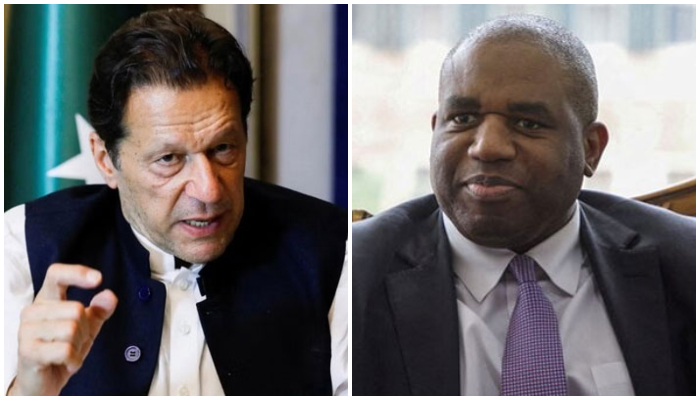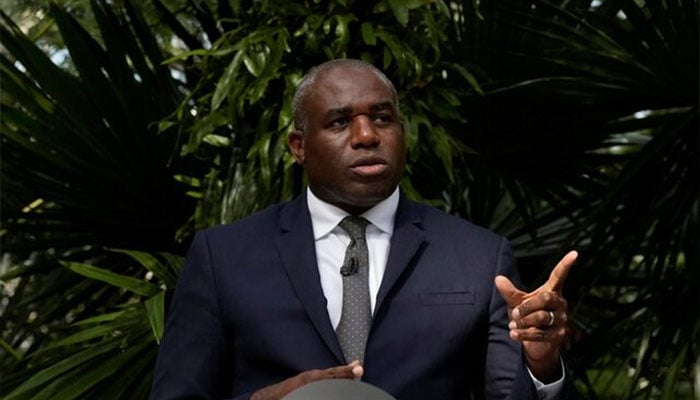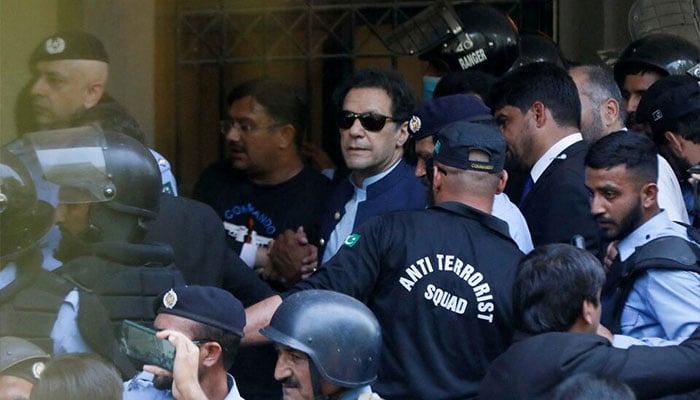LONDON: Asserting that “Pakistan judicial processes are a domestic matter”, British Foreign Secretary David Lammy said that Pakistani authorities gave no indication that they intend to try former prime minister and Pakistan Tehreek-e-Insaf (PTI) founder Imran Khan in a military court.
The UK Secretary of State for Foreign, Commonwealth and Development Affairs said this in his response to Kim Johnson MP’s letter which he wrote to the British government on request of Zulfi Bukhari, Khan’s adviser on international affairs.
Lammy MP said: “I have raised concerns about the potential use of military courts to try civilians, including Imran Khan. Such courts can lack transparency and independent scrutiny, making it difficult to assess compliance with international standards.”
“We have no recent indications from the Pakistani authorities that they intend to try Imran Khan in a military court, but my officials continue to monitor the situation closely,” he added.
Bukhari had arranged a letter for the UK government from 20 MPs from all parties, a month ago. It had raised concerns about the changes in judiciary and the passage of 26th Amendment.
The foreign secretary said: “While Pakistan’s judicial processes are a domestic matter, we have been very clear that the Pakistani authorities need to act in line with their international obligations and with respect for fundamental freedoms, including the right to a fair trial, due process and humane detention. This applies to Imran Khan as it does to all Pakistan’s citizens.”
Lammy said: “Like you, I remain concerned by restrictions on freedom of expression and assembly, including in relation to the political opposition. In our engagements with the authorities, we continue to underline that the freedom to hold and express views without censorship, intimidation or unnecessary restriction is a cornerstone in a democracy.
“The FCDO [Foreign, Commonwealth and Development Office] minister responsible for Pakistan, Falconer, has raised the importance of upholding civil and political rights with Pakistan’s Human Rights Minister Azam Nazeer Tarar. Minister Falconer is due to visit Pakistan later this year, and I have asked him to arrange a meeting with you and other interested parliamentarians on his return.
“With regard to Pakistan’s constitutional amendments, I note that these were passed by Pakistan’s parliament in October. While any amendment to Pakistan’s constitution is a matter for Pakistan, we have been clear that an independent judiciary, able to check and balance other state organs, is critical to a functioning democracy. The UK will continue to work with Pakistan across the breadth of our shared interests.”
Welcoming the letter, Bukhari said: “Once again on behalf of the people of Pakistan I would like to thank Kim Johnson MP and all the other honourable members of Parliament & the House Of Lords who signed the letter raising grave concerns about Imran Khan’s illegal incarceration and the lack of human rights currently in Pakistan.”
“Thank you Foreign Secretary David Lammy for the reply and addressing the letter. The people of Pakistan are truly suffering in unimaginable ways due to the actions of a tyrannical unelected government. Respect for free and fair elections, and the rule of law, underpinned by an independent judiciary, are the bedrock of a democracy. Pakistanis continue to struggle for theirs,” added ex-PM Khan’s aide.
The signatories to the original letter were: Johnson MP, Paula Barker MP, Apsana Begum MP, Liam Byrne MP, Rosie Duffield MP, Gill Furniss MP, Paulette Hamilton MP, Peter Lamb MP, Andy McDonald MP, Abtisam Mohamed MP, Bell Ribeiro-Addy MP, Zarah Sultana MP, Steve Witherden MP, Nadia Whittome MP, Baroness Joan Bakewell, Baroness Christine Blower, Lord Peter Hain, Lord John Hendy and Lord Todoanfel.











